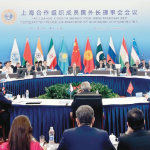They say “work is worship!” However, by worship we generally mean “an act of devotion before God, the Almighty.” Now, any work is undertaken by an individual to sustain the self which has been created by God with a purpose. Thus by remaining active a person participates in the Divine Purpose because by remaining idle he will single himself out of the active and dynamic cosmos and such a person will naturally “turn his brain into devil’s workshop!” However, each and every thing in the cosmos performs its job in an accurately disciplined and organized manner. It is by dint of this discipline and organization that balance and equilibrium is maintained, otherwise everything would have been in disharmony and disarray.
Since human beings have been bestowed with freedom of will which allows them to perform their role in the way they desire, therefore, they need to follow some pattern which should not be thrust on them from without but it should instead emerge from within and this pattern should have a capacity to harmonize all human activities. This self-imposed pattern is very much necessary for human beings who need something different both from the instincts as well as the laws which, although important, don’t leave too much room for the development, enrichment and evolution of the human condition. It is this pattern which has the capacity to beautify and embellish all human activities and, at the societal level, takes the human endeavour to its culmination through “the excellence of professionalism!”
This pattern which human beings must abide by voluntarily is called ihsan (highest good or excellence) in the terminology of Islamic socio-psychological sciences. The significance of this expression can be gauged from its profuse usage in the Qur’an and the Traditions of the Prophet (SA‘AS). However, the practical implication of this term (ihsan) can be fathomed best when it is contrasted with ‘adl (justice) because the latter term has the legal significance while as the former basically carries a voluntary significance. The Qur’anic verse recited in every Friday sermon defines these terms as: “Allah commands justice (‘adl) and the doing of good (ihsan).” (16:90) Thus ihsan (excellence or beauty of character) is to give others more than one is legally (by ‘adl) bound to do. That is why human beings are commanded to do ihsan (behave in the best way) to their parents because parents can in no way demand or force their children to offer them the same due to the old age, declining influence or both.
There is an elaboration of the term ihsan in the famous Tradition of Jibril (Hadith-i Jibra’il). After enquiring about iman (faith in God) and islam (submission to God) from the Prophet (SA‘AS), the arch-angel Jibra’il (Gabriel) asks the Prophet (SA‘AS) “what ihsan is?” The Prophet (SA‘AS) is reported to have replied: “You worship God as if you see Him; for if you don’t see Him, He sees you (still)!” (Sahih Muslim) Now, so far as the case of worship (‘ibādah) is concerned, it doesn’t mean just a set of rituals detached from the behaviour and character of the individual. Actually, any task (work) performed for the pleasure of the Lord, which intrinsically is beneficial both for the individual as well as the society, is worship. Such a task has the capacity to bind the individual vertically with the Lord and horizontally with the human society. That is why the Qur’an gives this broad vision of worship or ‘ibadah: “And I have not created Jinss and men, except that they should worship Me.” (51:56)
Ihsan, as such, is that “art of living” which makes an individual a professional in the true sense of the word. It makes a person spiritual by first making him understand the things as they are and then by encouraging him to perform different tasks as they should be performed. This course of action is indeed “spirituality in action” by dint of which the terrestrial realm reflects the theophany (epiphany or tajalli) of the celestial realm. No wonder then that the Sufis (Muslim mystics) banked upon the term ihsan to broaden the spiritual canvas of their path knowing well that the word suf (literally wool, thus Sufism), by which they had christened their way, was neither derived from the Qur’an nor from any of the Prophetic Traditions.
The societal significance of the term ihsan is so great that it makes a person a true practitioner or professional. The Prophet (SA‘AS), in this regard, is reported to have said that even an animal should be slaughtered with ihsān, that is, in an excellent (expert) way so that the animal feels no pain because God loves the one who performs things in a nice way (ihsān, Sahih Muslim). It is very interesting to note here that Sayyiduna Ali (R‘A), one after the other, had named his three sons Harb (literally War) which the Prophet (SA‘AS) changed to Hasan (Beauty), Husain (Little Beauty) and Muhsin (Benefactor, one who performs things beautifully or does good to others) and all the three names are derived from husn (beauty), the root of ihsan! While guiding people in the economic realm, the Qur’an uses the expression “qard-i hasan” (goodly loan) which, God says, the giver or lender will receive back manifold on the Day of Requital. Naturally, this is such a loan on which the lender receives no interest and the borrower not only repays it at his ease but has to pay just the principal sum. This loan is thus “good” (hasan) in every respect and has the capacity to eradicate poverty and to uplift the downtrodden sections of the society.
This concept of beauty and beautification, ihsan being the summation thereof, also binds together the aesthetic and spiritual realms in Islam. Even in the creation of man this concept is intrinsic because man has been given the “best of the moulds” (ahsan al-taqwim) and God has been called the “the Best of the Creators” (ahsan al-khaliqin)! It is no wonder then that the concept (of ihsan) defines one of the main dimensions of Islamic morality and has percolated so much deep into the Muslims’ social psyche that even the uneducated among them instantly recite the Qur’anic verse hal jaza’ al-ihsan illa al-ihsan (Is there any Reward of Good –other than Good?”, 55:60), whenever they witness some selfless altruistic gesture from any individual or quarter!
(The author is Assistant professor Islamic Studies at GDC Kokernag. E-mail:[email protected])








